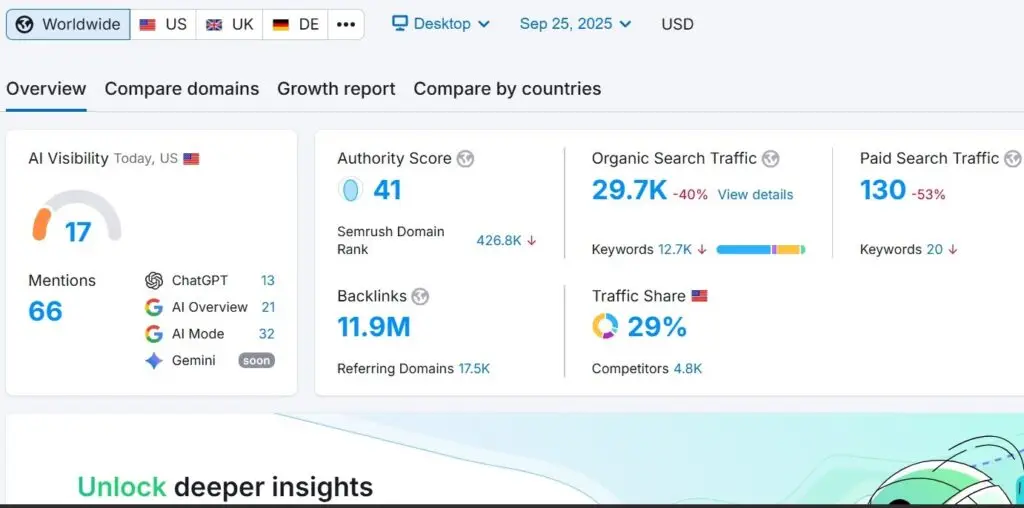Semrush Bolsters AI Search Defenses: New Dashboard Tracks Visibility Amid SEO’s AI Overhaul
Obah Sylva
September 26, 2025

In a digital landscape where artificial intelligence is rewriting the rules of discovery, Semrush, the SEO powerhouse behind tools used by millions of marketers, is doubling down on helping brands navigate the chaos. The company unveiled an enhanced AI Visibility Overview dashboard this week, a feature designed to demystify how often, and how favorably, businesses appear in responses from leading AI search engines like ChatGPT, Google’s AI Mode, and Perplexity. As generative AI platforms siphon traffic from traditional search results, Semrush’s update arrives at a pivotal moment, offering marketers a lifeline to track and optimize their presence in an era where “search” increasingly means conversational answers rather than blue links.
The dashboard, integrated directly into Semrush’s core analytics suite, provides real-time metrics on brand mentions, citation frequency, and sentiment across AI platforms. Users can now benchmark their visibility against competitors, identify gaps in AI responses, and even forecast potential traffic shifts from large language models (LLMs). For instance, the tool calculates an “AI Visibility Score” by comparing a brand’s mention rate to industry medians, highlighting opportunities to refine content for better AI “crawlability.” Priced at an additional $99 per month per domain for deeper insights, it’s positioned as an accessible upgrade for Semrush’s 10 million-plus users, many of whom are already grappling with declining organic clicks.
“AI search isn’t just another channel, it’s the new front door to the web,” said Eugene Lata, Semrush’s Chief Product Officer, in an exclusive interview. “Our dashboard empowers marketers to see beyond Google rankings. If your brand isn’t cited in ChatGPT’s answers, you’re invisible to a growing slice of users. We’re giving them the data to fight back.” Lata pointed to Semrush’s recent AI Visibility Index, a benchmark study analyzing over 68,000 prompts across industries, which revealed that community-driven sources like Reddit often outrank official brand sites in AI outputs, a stark reminder of SEO’s shifting sands.
Read Also:
- Zero Clicks: How to Adapt to Save Your Brand
- Google Search Console Adds ‘Achievements’ Report to Celebrate Your SEO Milestones
- Google’s Silent SERP Tweak Upends SEO Industry: &num=100 parameter vanishes, sparking data chaos, cost surges
This launch builds on Semrush’s aggressive 2025 AI push, including the January rollout of Otterly, an App Center tool for monitoring AI prompt performance and link citations, and the June introduction of an AI Traffic Dashboard that traces referral traffic from models like Gemini and Copilot. Early adopters, like a Scottsdale-based local SEO agency, have praised the features for uncovering hidden LLM-driven visits, up to 7% of total traffic in initial tests—prompting quick tweaks to FAQ sections for better AI alignment. Yet, not all feedback is glowing; some users on X (formerly Twitter) have balked at the add-on costs, calling it a “paywall for the AI future.”
The Broader Storm: AI’s Relentless Assault on SEO
Semrush’s moves come against a backdrop of profound disruption in search engine optimization. By mid-2025, AI Overviews in Google, those AI-generated summaries atop search results, have slashed website clicks by over 30%, even as impressions rise, in what’s dubbed “The Great Decoupling.” Platforms like ChatGPT and Perplexity have ballooned to 2.1% of global search market share, a 740% surge from early 2024, per Opollo’s study of 1,200+ companies. Users, frustrated by ad-cluttered traditional results and inaccurate AI snippets, are flocking to conversational tools: A May Fractl survey of 2,300 U.S. adults found 63% now query ChatGPT for complex needs, bypassing Google entirely.
The fallout? Traditional SEO tactics, keyword stuffing, backlink farming, are crumbling. Algorithms now prioritize semantic understanding and user intent over exact matches, with 90% of marketers planning heavier AI tool investments to keep pace. “SEO isn’t dying; it’s evolving into ‘Answer Engine Optimization’ (AEO) and Generative Engine Optimization (GEO),” explained Andrew Holland, a search strategist at Search Engine Land. “Agencies charging $2,000–$20,000 monthly retainers risk obsolescence unless they automate with AI—costs could plummet to $500.”
Industry voices echo the urgency. On X, digital marketer Corey Alderin noted how habit shifts, young users discovering churches via ChatGPT, signal a deeper behavioral pivot. A GlobalData survey revealed over 50% of businesses facing AI-induced sector shakeups, with affiliates and influencers staring down $20–$37 billion in lost revenue as the “open web” billboard model erodes. Even Reddit threads buzz with debate: “SEO’s still worth it in 2025, but it’s about genuine value amid AI floods,” one user argued, tallying 53 comments on the topic.
Strategies for Survival: From E-E-A-T to AI Symbiosis
For brands, adaptation is non-negotiable. Semrush’s toolkit emphasizes building “authority where AI looks”—Wikipedia entries, Reddit threads, and neutral, factual content over salesy posts. Experts advocate E-E-A-T (Experience, Expertise, Authoritativeness, Trustworthiness) as “armor against disruption,” alongside repurposing content for multi-channel reach. Tools like Jasper for copy or Canva’s AI for visuals are automating grunt work, freeing humans for strategy—though purists warn against over-reliance, as AI-generated content risks penalties from evolving algorithms.
Hospitality giant Hostaway, for one, is hiring a Director of SEO to spearhead AEO/GEO transitions, signaling enterprise buy-in. “We’re redefining discovery in AI-driven worlds,” their job posting reads. Meanwhile, Neil Patel’s data-driven take? Google still commands 63% of U.S. traffic—SEO lives, but as “search everywhere optimization.”
As 2025 closes, Semrush’s dashboard isn’t just a feature, it’s a manifesto for resilience. With AI poised to handle 90% of customer queries in sectors like finance and marketing, the winners will be those who treat visibility as a dynamic metric, not a static rank. For now, the disruption rages on, but tools like these offer a map through the fog. Marketers, take note: In the age of answers, invisibility is the real killer app.
